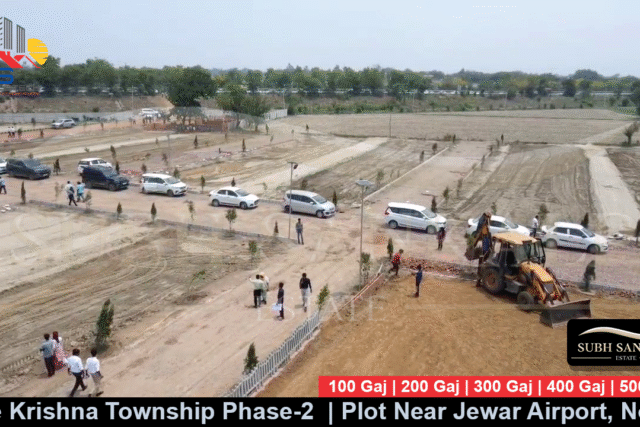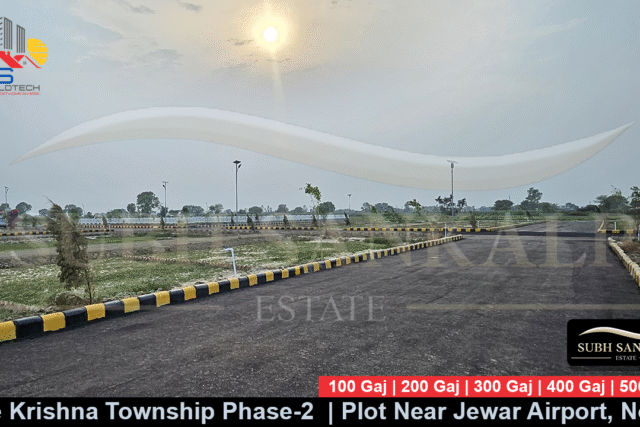200 Gaj Tappal Jewar Airport – Hare Krishna Township Phase 2 at Jewar is poised to be a transformative infrastructure project for the Delhi-National Capital Region (NCR). A critical element of its multi-modal logistics strategy is the development of a dedicated cargo hub at Gaj Tappal. This 200-acre facility is designed to be a powerhouse for freight and logistics, complementing the main passenger terminal and establishing the region as a key economic gateway.
1. Strategic Location and Rationale
The Gaj Tappal site is strategically chosen for its proximity to the upcoming Western Dedicated Freight Corridor (WDFC) and the Yamuna Expressway. This integration with road and rail networks is pivotal. The primary vision is to create a seamless, multi-modal cargo ecosystem where goods can be efficiently transferred between aircraft, freight trains, and trucks, drastically reducing transit times and logistics costs for businesses across North India.
2. A Dedicated Cargo-Centric Airport
While the main Jewar airport will handle both passengers and cargo, the Gaj Tappal facility is envisioned as a dedicated cargo airport. This specialization allows for infrastructure and operations tailored specifically to the needs of freight forwarders, logistics companies, and e-commerce giants. It will focus on handling perishable goods, express parcels, heavy machinery, and international freight, operating 24/7 to meet global supply chain demands.
3. Phased Development and Infrastructure
The development will likely occur in phases, aligned with the overall stages of Noida International Airport.
- Phase 1: Initial infrastructure will include cargo aprons for freighter aircraft, cargo terminals with cold storage facilities, customs clearance areas, and truck docks.
- Future Phases: Expansion will incorporate specialized zones such as a Free Trade Warehousing Zone (FTWZ), a cargo village for logistics firms, and advanced warehousing solutions. Direct connectivity via a spur line from the WDFC will be a key later-stage development.
4. Economic Impact and Opportunities
The Gaj Tappal cargo hub is expected to be a significant economic catalyst.
- Boost to Exports: It will provide Uttar Pradesh-based industries (like handicrafts, textiles, and agricultural produce from the state’s hinterlands) with direct, efficient air cargo access to international markets.
- Logistics Hub: It will attract major domestic and international logistics players, creating a vibrant logistics ecosystem and generating substantial employment.
- E-commerce Growth: The facility will serve as a crucial hub for e-commerce companies, enabling faster delivery times and robust handling of peak-season volumes.
5. Synergy with Noida International Airport
The Gaj Tappal hub will work in tandem with the main Jewar airport. While bulk freight will be handled at Gaj Tappal, belly cargo from passenger aircraft at the main terminal will also be integrated into the supply chain. This dual-hub model ensures comprehensive cargo handling capacity, making the entire NIA complex a formidable player in the aviation and logistics landscape.
1. What is the difference between Jewar Airport and Gaj Tappal Airport?
Jewar Airport (Noida International Airport) is the main greenfield airport project handling both passenger and cargo flights. The Gaj Tappal facility is a dedicated 200-acre cargo hub developed as an integral part of the larger Jewar airport project, focusing exclusively on freight and logistics operations.
2. When will the Gaj Tappal cargo airport be operational?
The operational timeline for the Gaj Tappal hub is tied to the phased development of Noida International Airport. While the first passenger terminal is expected to be operational by the end of 2024, a specific date for the cargo hub’s inauguration has not been officially announced. It is likely to become active in subsequent development phases.
3. How will the cargo hub benefit local businesses?
Local businesses, especially MSMEs and agricultural producers in Western UP, will benefit from drastically reduced logistics costs and faster access to international markets. The hub will simplify export procedures, provide cold chain solutions for perishables, and attract more competitive logistics services to the region.
4. Will there be passenger flights from Gaj Tappal?
No, the Gaj Tappal facility is planned exclusively as a cargo hub. All commercial passenger flights will operate from the main terminal of Noida International Airport at Jewar.
5. How is the Gaj Tappal hub connected to the Dedicated Freight Corridor?
The project plans for direct connectivity to the Western Dedicated Freight Corridor (WDFC) through a proposed railway spur line. This will allow for the seamless transfer of containers between freight trains and cargo aircraft, creating an efficient multi-modal logistics pipeline.















Leave a review for 200 Gaj Tappal Jewar Airport – Hare Krishna Township Phase 2